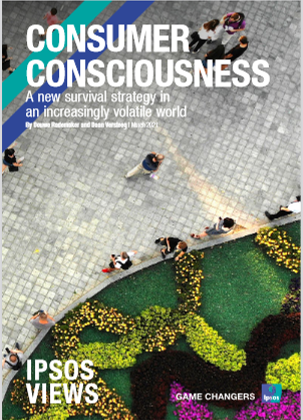Consumer Consciousness
 As the world has become more volatile, it’s more important than ever for brands to be able to react to changing consumer behaviour.
As the world has become more volatile, it’s more important than ever for brands to be able to react to changing consumer behaviour.
Companies with a high level of consumer consciousness are more aware and attuned to consumer needs and more agile to developing needs or market disruptions.
Consumer centricity is a term often used to describe a strategy to use consumer insights to drive the business. Companies are using different strategies to get closer to the consumer. However, these strategies will not result in a true consumer-centric organisation.
In this paper we outline a more holistic strategy, based on recent developments in neuroscience and data science/analytics to build a kind of consumer consciousness in an organisation. An integrated, learning system that puts the consumer at the heart of the business.
There are three elements of a consumer conscious company:
- The availability and connectivity of consumer data.
- The ability of a connected consumer data platform to create fresh, new consumer insights with appropriate analytical capabilities.
- The level of activation of these consumer insights and feedback of learnings to the consumer data platform.
For companies looking to get consumer consciousness right, we identified five critical success factors. These are:
- First, we believe that insights generation is a specific skill and its responsibility and curation should be under a single command. This ensures consistency of quality and the ease in which insights can be activated in profitable marketing interventions.
- Second, the insights should be holistic and ‘de-siloed’ to make sure we build on the integration of various data sources. It is increasingly important that companies develop strong links between insight generation and digital analysts, computer scientists, and marketers.
- Thirdly, manual, qualitative, curation will always be a key skill in the creation of consumer insights. But in an automated data world, insights can also be generated through digital analytics and data science.
- Fourth, consumer data collection and insights generation are not ad-hoc activities. It should be an ‘always-on’ capability where data collection and insights generation is a 24-7 automated activity. What’s important is to consider a smart data strategy and architecture to be able to manage large amounts of consumer data from various sources in an integrated platform.
- And fifth, to reduce complexity, we believe that a conscious consumer data ecosystem should be built and maintained with a small number of external partners.

![[Webinar] Global Voices of Experience 2026 - Ipsos](/sites/default/files/styles/list_item_image/public/ct/event/2026-02/global-voices-of-experience-carousel.webp?itok=BEAGdhsC)

